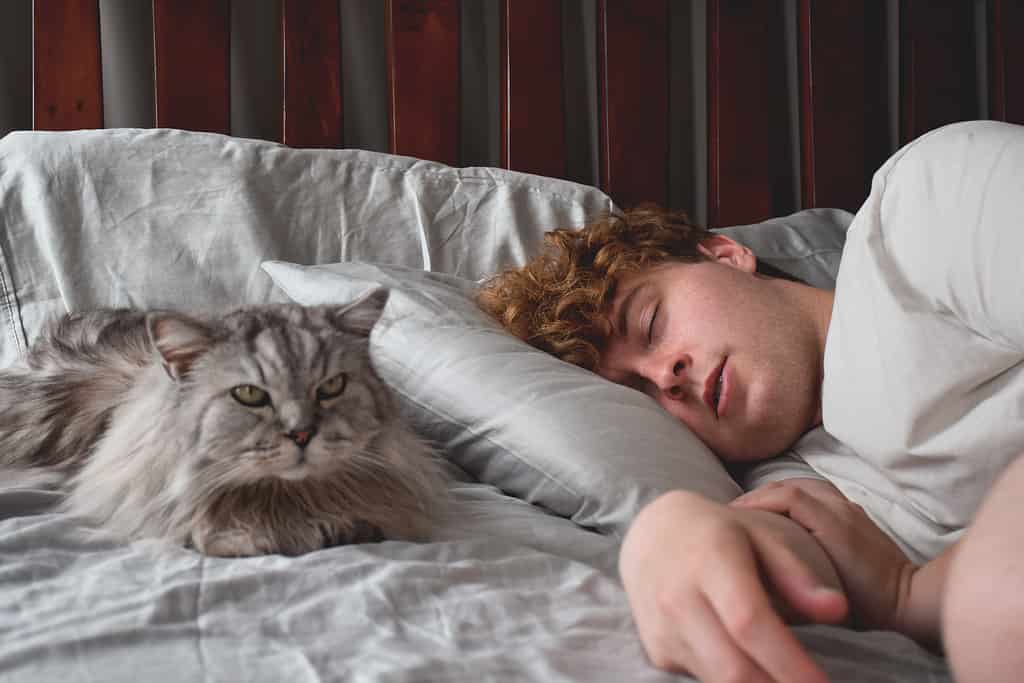If you’ve ever given a cat catnip, you’ve seen the amazing effects that it can have on our feline friends. From calming cats down to giving them a rush of energy, catnip is a remarkable perennial herb. You wouldn’t be the first person to wonder if humans can eat catnip and use it for similar reasons.
Below, you will find everything there is to know about catnip for human consumption, whether or not it’s safe, and what effects it may have on your mind and body.
What is Catnip?

You should sow catnip seeds in Mid-March.
©iStock.com/guppys
Did you know that catnip is part of the mint family? It’s native to several areas of Europe, China, and Central Asia. You can grow catnip in your yard or indoors. The plant typically grows three feet tall and blooms during the warmer months.
How Does Catnip Affect People?

Always check with your doctor before trying catnip.
©Pawel Michalowski/Shutterstock.com
Some research shows that catnip can be safe for human consumption. One of the most popular methods is to brew catnip into a tea. It’s important to note that it is thought to be unsafe when smoked.
Some of the most common side effects of catnip are:
- Feeling sick
- Headaches
- Vomiting
Those who are pregnant should avoid consuming catnip before clearing it with their medical team. Because this is part of the mint family, avoid catnip if you have any allergies to mint.
Catnip Interactions

If you’re taking any medication, you should always be aware of potential interactions. Catnip does have some side effects when interacting with lithium and sedatives. Ingesting this plant has a diuretic effect on the human body that may increase urination.
Because of this, it can alter how the body gets rid of lithium. For those taking CNS depressants, be aware that catnip can cause you to feel tired or drowsy. Taking catnip with a sedative medication may cause you to become too sleepy to perform daily tasks.
Some other medications that catnip may interact with are as follows.
- Barbiturates
- Benzodiazepines
- Doxylamine
- Anticonvulsants
- Tricyclic antidepressants
- Insomnia medications
- Diphenhydramine
Catnip Benefits

One of the most popular reasons to use catnip is to help you sleep.
©JulieAlexK/iStock via Getty Images
There are many health benefits to consuming catnip in small doses. Due to a lack of research, we suggest avoiding smoking catnip or applying it topically. As always, talk with your medical team about introducing this plant into your diet.
We here at A to Z Animals are not medical professionals.
Sleep Aid
As previously mentioned, catnip can be utilized to help you sleep. One of the main compounds is valepotriates, which is also found in valerian. Many people with sleeping issues will enjoy a cup of catnip tea before bed to help them get a good night’s rest.
Anxiety Relief
Anxiety can be debilitating, and finding something to take the edge off can be a chore. Because of the sedative-like feelings this plant provides, it can help ease nerves, decrease stress, and calm anxiety. Some herbalists even say it’s beneficial for those with hyperactivity.
Cold Remedy
Did you know that catnip is a common plant in holistic sickness remedies? Several plants, such as mullein and licorice root, are found in teas to help soothe an itchy or sore throat. Catnip is a diaphoretic herb that can cause you to sweat, thus bringing down a fever.
Digestion Mover
Filled with antispasmodic properties, catnip works wonders for those suffering from cramps or indigestion. It can also help with gas, bloating, and constipation. One mother reports that putting catnip on a baby’s stomach can ease colic. Some say that when you eat catnip, it can help with morning sickness, but there is little actual research on this.
Pain Relief
When you have chronic pain, you likely look for a solution just about anywhere. Traditionally, catnip can be used to help aching muscles, gout, migraines, arthritis, cramps, and even postpartum contractions.
Libido Boost
While it is considered a side effect, many don’t mind having it. Catnip, is in fact, an aphrodisiac. This means it can increase arousal, pleasure, and overall sex drive. A study shows that rats that ate catnip had longer erections and improved sexual behaviors.
How to Prepare Catnip For Human Consumption
Now that you know that catnip is safe in small doses for those who do not take lithium or sedatives, how do you take it? The most popular method is to brew tea. This is incredibly easy, and you must mix the dried plant into boiling water for around 10 minutes.
We suggest trying this for the first time in the comfort of your own home and right before bed. You can mix in other herbs such as licorice root, peppermint, or a drizzle of honey.
Thank you for reading! Have some feedback for us? Contact the AZ Animals editorial team.








